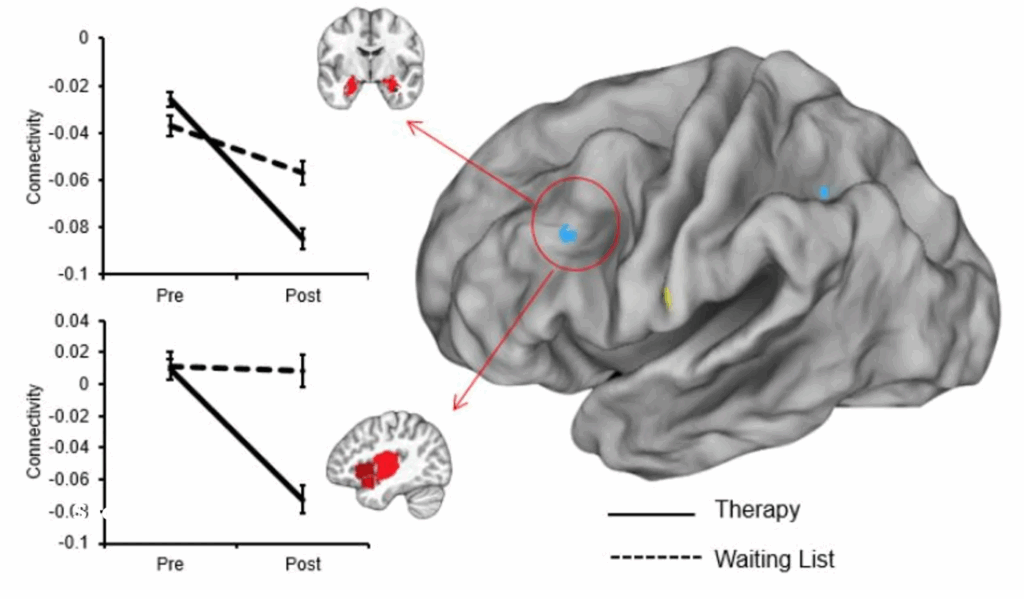Psychotherapy: Reshaping Your Brain for Positive Mental Health
- Dnyanada
- October 2, 2023
Up until the age of 12, I held the misconception that mental illness was relegated to a grim and unsettling wing of the hospital. I envisioned it as a place characterised by sterile, white walls, and disquieting noise levels from distressed patients. If you were exposed to the same unfortunate media representations as I was, you’d probably have an instinctive aversion to the idea of therapy. I mean, who wants therapy for mental health? No thanks, I’ll pass.
But with my own personal experience, and a wealth of scientific research as supporting evidence, I’ve come to realize that you need not be “clinically diagnosed” to need psychotherapy. Life is difficult and being aware of one’s thought patterns and behavioural tendencies can be very beneficial. But before we get into the benefits, what is psychotherapy?

Source: https://mimiandeunice.com
What is Therapy?
Therapy is a structured intervention aimed at addressing and improving one’s emotional, mental, or psychological well-being. The intervention can encompass various techniques, from structured dialogues to the utilisation of tools such as meditation, monitoring of physiological functions, artistic expression, and even virtual reality experiences. While all these might sound trivial, they have shown profound effects on our brains.
Brain is Plastic, It’s Fantastic
A fundamental concept in neuroscience is neuroplasticity, the brain’s ability to rewire its circuits based on experiences. Talk therapy leverages this by aiding in the rewiring process. Our thoughts, emotions, beliefs, and behaviours are connected through neural pathways, where negative thought patterns or maladaptive behaviours often have well-established neural circuits in the brain. Talk therapy offers a platform for individuals to explore and, with the therapist’s guidance, reshape their thought patterns. Over time, this can promote positive thinking and healthier behaviours.

Brain scans show that psychotherapy can change the neural circuitry of the brain
Psychotherapy reduces connectivity between the emotional brain and cognitive center (bottom graph), as well as between the emotional brain and the brain region responsible for planning and thinking (top graph)
Modified from the publications of Prof Greg Fonzo, University of Texas
The power to genuinely reshape your brain is quite extraordinary. But now, let’s address an important question: Can these changes endure, or do they revert to the brain’s baseline state after therapy concludes? Well, the findings from a comprehensive, long-term study examining self-reported mental health scores among individuals who underwent therapy for insomnia are quite promising. It turns out that the beneficial effects of therapy persist for an impressive span, of up to ten years after the end of therapy!
Spillin’ It Out!
Life can be challenging, with unexpected twists and turns, especially when one lacks self-awareness of their thoughts and behavioural patterns. Many of my clients admit to acting without conscious consideration of their actions, to the extent that they describe it as feeling as though someone else had taken control, causing them to feel disconnected from their true selves.
We’ve all been there, right? Take a moment to reflect—have you ever caught yourself:
Wrestling with your emotions? Maybe during a heated argument with your partner, you couldn’t hold back the tears or you let anger take over, resulting in objects being tossed around?
Bending over backward to please everyone? Spending hours inside your own head, overanalyzing what others might think of you?
Struggling to utter that simple word, “no”? Or finding it nearly impossible to set clear boundaries?
Drowning in responsibilities? Picture this: a lengthy to-do list, yet you strangely find solace in scrolling through your Instagram feed, squandering time away.
Experiencing a profound sense of emptiness and aimlessness? Like you’re being swallowed up by the notion that “nobody cares—what’s the point anyway?”
Attracted to toxic relationships and individuals who don’t treat you with respect?
Battling an addiction to substances that you know are detrimental to your well-being?
Relentlessly pursuing accomplishments without ever savouring contentment, always measuring yourself against others and coming up short?
Many of these behaviours can be traced back to our formative years, when we began to construct our understanding of the world. Our child-like brains absorbed feedbacks from our care-takers or peers and confined them into core beliefs that silently influence our behaviours. Fortunately, they can often be resolved through the process of self-awareness. Essentially, this is what therapy is —a constructive dialogue between you and me to delve into the reasons behind your actions, trace the origins of your behaviors, and explore your inner aspirations and desires.
Taking the first step of seeking support can be daunting. That’s why I extend an invitation to you for a free session – a chance for us to chat and for you to gain a sense of what it’s all about.
Liked what you read?
Sign up and get the latest blog posts delivered straight to your inbox.
We respect your privacy
Related Articles

Domestic Violence Among Indian Families and its Impact on the Brain
In Indian families, domestic violence often hides behind cultural norms. This blog reveals shocking statistics and its impact on the brain.

Grief Explained: How our brains process loss
Discover the emotional and neurological aspects of grief, how rituals aid in healing, and why it’s okay to take your time.

Craving Connection: A Scientific Look at Why We Feel Lonely
Dive into the neuroscience of loneliness and discover why our brains crave real connection.
